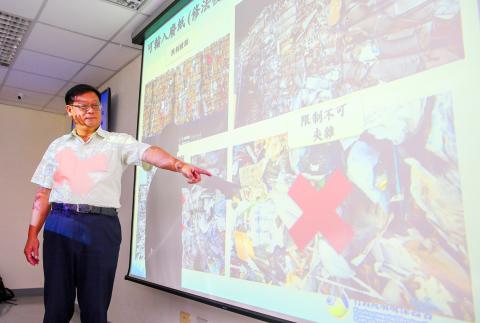The Environmental Protection Administration (EPA) yesterday proposed new regulations to curb imports of waste plastic and paper, as the amount has soared since China implemented a ban on such imports in January.
The Chinese State Council in July last year announced a ban on imports of 24 types of solid waste, including plastics and textiles, unsorted paper and mining slag. The rules came into force at the beginning of this year.
The ban “will send shockwaves around the world,” Greenpeace East Asia said in December last year, adding that in 2012, up to 56 percent of global exported plastic waste went to China.

Photo: CNA
Taiwan has felt the effects of the ban, as countries including Japan, the US, the UK, Philippines, Mexico and Germany began exporting waste to Taiwan, EPA Department of Waste Management Director-General Lai Ying-ying (賴瑩瑩) told a news conference in Taipei.
The amount of imported waste plastics over the first six months was about 2.5 times more than in the same period last year, while the amount of imported waste paper — despite not increasing greatly — exceeded 150,000 tonnes in March, Lai said.
Domestic firms do not need to apply for government approval to import waste plastics and paper, because they can be used as industrial materials, but with the increasing volumes, the quality has degraded, while prices for domestic recycled waste have plunged, she said.
To protect the nation’s economy and environment, the EPA proposed amendments to the Regulations Governing Business Wastes Used as Industrial Materials (屬產業用料需求之事業廢棄物), which would restrict imports and regulate importers.
Local firms can only import waste plastics that originate from their own overseas production processes and waste paper that is non-bleached kraft paper, corrugated paper or cardboard, the agency said, adding that nothing should be mixed with other waste.
Only firms that have a license are allowed to import waste for industrial use, it said.
Among the proposed changes are rules to push firms to purchase domestic wastes first and to ensure that imported waste is of an acceptable quality, EPA Deputy Minister Chang Tzi-chin (張子敬) said.
The announcement comes with a 60-day notification period, the agency said, adding that it would hold hearings to gather opinions.
The new regulations should come into effect in October at the earliest, it said.

Taiwanese can file complaints with the Tourism Administration to report travel agencies if their activities caused termination of a person’s citizenship, Mainland Affairs Council Minister Chiu Chui-cheng (邱垂正) said yesterday, after a podcaster highlighted a case in which a person’s citizenship was canceled for receiving a single-use Chinese passport to enter Russia. The council is aware of incidents in which people who signed up through Chinese travel agencies for tours of Russia were told they could obtain Russian visas and fast-track border clearance, Chiu told reporters on the sidelines of an event in Taipei. However, the travel agencies actually applied

Japanese footwear brand Onitsuka Tiger today issued a public apology and said it has suspended an employee amid allegations that the staff member discriminated against a Vietnamese customer at its Taipei 101 store. Posting on the social media platform Threads yesterday, a user said that an employee at the store said that “those shoes are very expensive” when her friend, who is a migrant worker from Vietnam, asked for assistance. The employee then ignored her until she asked again, to which she replied: "We don't have a size 37." The post had amassed nearly 26,000 likes and 916 comments as of this

New measures aimed at making Taiwan more attractive to foreign professionals came into effect this month, the National Development Council said yesterday. Among the changes, international students at Taiwanese universities would be able to work in Taiwan without a work permit in the two years after they graduate, explainer materials provided by the council said. In addition, foreign nationals who graduated from one of the world’s top 200 universities within the past five years can also apply for a two-year open work permit. Previously, those graduates would have needed to apply for a work permit using point-based criteria or have a Taiwanese company

The Shilin District Prosecutors’ Office yesterday indicted two Taiwanese and issued a wanted notice for Pete Liu (劉作虎), founder of Shenzhen-based smartphone manufacturer OnePlus Technology Co (萬普拉斯科技), for allegedly contravening the Act Governing Relations Between the People of the Taiwan Area and the Mainland Area (臺灣地區與大陸地區人民關係條例) by poaching 70 engineers in Taiwan. Liu allegedly traveled to Taiwan at the end of 2014 and met with a Taiwanese man surnamed Lin (林) to discuss establishing a mobile software research and development (R&D) team in Taiwan, prosecutors said. Without approval from the government, Lin, following Liu’s instructions, recruited more than 70 software